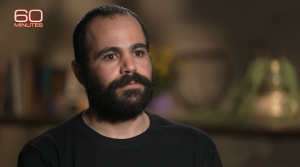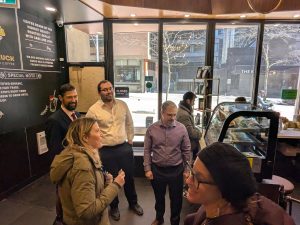Yoav Limor, veteran defence correspondent for the newspaper Israel Hayom and host of a news show on Channel 1, spoke in Hamilton recently at an event organized by the local office of the Jewish National Fund (JNF). He argues the best hope for peace between Israel and its neighbours lies in economics rather than military action.
What is the political state of Israel today? Are we approaching some kind of stability?
Israel is in a state of political deadlock currently because after three electoral campaigns we have not been able to decide whether it is this side or the other side that should be in power and form a government. Prime Minister Benjamin Netanyahu thought that after the exit polls showed him ahead, he was going to be able to form a government, but it seems now he has no power to do it.
There are three options. One is a unity government. That would take the Blue and White to sit with Netanyahu, which they have said they will not do. The second option is for the Blue and White party to either form a government that relies on the Arab parties. The third option is to go for a fourth election in September.
What is the reluctance to form a government based on the Arab parties?
I think there are three reasons. At the end of the day many Israelis still believe Israel is a Jewish state, a state of the Jewish majority. The second thing is they were never part of the government in the past, although Yitzhak Rabin relied on them in 1997 to form a government. Third is that within the Arab party there is a part that is very radical and supports Hamas, so people ask how can you form a government with a Knesset member who supports our enemies? Jews and Arabs in the Middle East have been an issue forever and it will definitely take time until this issue will be solved.
What is it like as a journalist to try to cover this, to make sense of it all?
That’s two different things. To cover it is easy, to make sense of it is impossible because you can’t make sense of what doesn’t make sense. There is no sense that Israel is deadlocked, that Israel is only busy with whether to go for Netanyahu or against Netanyahu. The only thing Israel is busy with for the past year is, as we say, to Bibi or not to Bibi? The citizens of the state are more important than any prime minister, no matter who he is. That is something Israel should get over and get back to dealing with Israel and not one person or another.
Where is the best hope for peace?
I think with the Arab world as a whole. The Arab world has taken a huge step toward Israel since the Arab Spring. I don’t know that peace is the right word, but I think there is a possibility to see a normalization with most of the Arab world, mostly in the Gulf states. With the Palestinians it will be more complicated. I don’t see “the deal of century” as a breakthrough. It is a very good deal for Israel, but I don’t see it as a practical solution because it definitely won’t bring the Palestinians in.
Is that simply because of the Palestinians’ history of never missing an opportunity to miss an opportunity?
It’s because “the deal of the century” is one-sided. It is very much in favour of Israel and the demands it makes of the Palestinians are impossible for any Palestinian leader to agree to. I don’t like the fact this deal has been imposed on us by the Americans. I think we should speak to the Palestinians ourselves to reach any kind of deal that is balanced. We should do it, they should do it, but we lack leadership. I don’t see any Palestinian leader taking these tough decisions, definitely not Mahmoud Abbas. He is not taking tough decisions. I don’t see any solution with the Palestinians currently and that’s why we should try to look for other options, such as economic solutions, trying to live with them together, dealing with the level of their living, how they are living and try to raise them up.
So, some sort of solution based on economics seems to have the best promise?
Maybe. I think we should invest in that, the world should invest in that. I think it’s not in the interest of anyone, Israelis, Palestinians and the world for there to be an imbalance in the world. That is a good solution that we should all dig into and try to use.
Israel is exceptionally strong now, stronger perhaps than it has been at other times in the past. What’s the source of that strength?
First of all, we are a regional superpower when it comes to technology and military, but at the same time the weakness of the Arab states following the Arab Spring changed the balance dramatically in favour of Israel. As strong as we were, we became stronger because our enemies became weaker. It could change, but Israel is strong and safe now and I don’t see any existential threat to Israel in the near future.
Not even a nuclear Iran?
That is not in the cards currently. It’s hypothetical. Israel should do everything it can to prevent that, the world should do everything it can to prevent that. Should Iran become nuclear, which I hope it won’t, we will deal with that question, but it is not nuclear now so that is not on the table.
What are the chief threats other than a nuclear Iran?
I don’t think of them as threats, I think of them as challenges. Hezbollah and the 100,000 missiles they have in Lebanon and might shoot at Israel; Hamas and the 2 million people living in Gaza, in the biggest jail in the world. We face many other challenges within Israel – health, education, construction and others. We also face many challenges within the Jewish people itself, the amount of hatred that was ignited during those three electoral campaigns is enormous, left and right, secular and religious, settlers and non-settlers. Those are huge problems. Relations with the Jewish Diaspora are also an issue. There are quite a few challenges that Israel has to face to be safe in the future.
What is it going to take to face those challenges?
Strong government and good leadership, like everywhere else.
This interview has been edited and condensed for style and clarity







